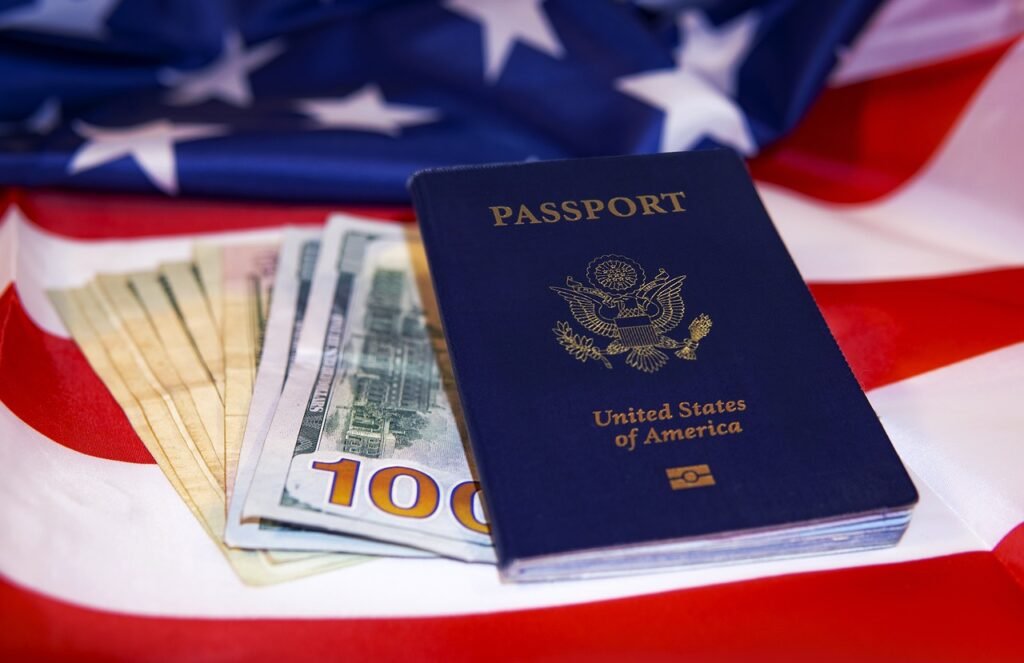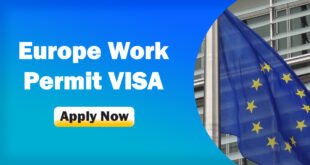Free Work Visa for the U.S. from All Countries: What You Need to Know
SEE DETAILS
For many, working in the United States represents a chance to advance their careers, experience a new culture, and explore new personal and professional growth avenues. However, obtaining a U.S. work visa is often a complex and expensive process that involves multiple steps, fees, and specific eligibility requirements. from all countries can be misleading, as there is no official free work visa. However, there are ways to minimize expenses and streamline the application process, and certain programs and conditions may make obtaining a visa easier or less costly.
This article provides an in-depth overview of U.S. work visas, options available to foreign workers, associated fees, and practical steps to manage costs.
Understanding U.S. Work Visas and Types

The United States offers a variety of work visas to cater to the specific needs of foreign workers and U.S. employers. Each type has its own eligibility criteria, benefits, and restrictions. The most common U.S. work visas include:
H-1B Visa
This is one of the most popular work visas for skilled professionals in specialized fields, such as IT, engineering, and healthcare. It allows foreign nationals to work in the U.S. for up to six years, sometimes leading to a green card.
L-1 Visa: The L-1 visa is intended for multinational employees, allowing workers at international companies with U.S. offices to transfer to the U.S.
E-3 Visa: Exclusively for Australian citizens, the E-3 visa allows qualified professionals to work in the U.S.
O-1 Visa: Designed for individuals with extraordinary abilities in areas such as science, arts, business, or athletics, the O-1 visa allows highly talented professionals to work in the U.S.
without requiring sponsorship for a traditional work visa.
Are U.S. Work Visas Ever Free?
Technically, no work visa is entirely free for applicants from any country. Work visas come with associated costs, which may include government filing fees, legal fees, and other charges depending on the visa type. However, several factors can reduce the applicant’s cost burden:
Employer-Sponsored Fees: Many work visas require sponsorship by a U.S. For example, in the case of the H-1B visa, the employer is legally required to pay certain filing fees.
Visa Waivers or Fee Reductions: Some programs, such as the TN visa for Canadians and Mexicans, offer fewer restrictions and lower costs than traditional work visas.
Special Programs and Agreements: For specific nationalities, such as Australians (E-3 visa) and certain categories of citizens from Chile and Singapore (H-1B1 visa), streamlined processes and lower fees may apply.
Practical Tips to Minimize Visa Costs
Although obtaining a completely free work visa for the U.S. may be unrealistic, there are practical ways to minimize costs:
Choose the Right Visa Type
Each visa type has different associated costs and requirements. Some, like the TN visa, are generally more affordable and faster to process than others, making them a suitable option for Canadians and Mexicans.
Seek employer sponsorship: Ensure that your prospective employer understands the visa process and is willing to cover some or all of the costs. Many employers, particularly in fields with high demand, offer financial assistance or full coverage of visa fees.
Work with Legal Professionals
While hiring an immigration attorney involves costs, it can help you avoid common mistakes, saving you time and money in the long run.
Consider Temporary or Alternative Visas: Depending on your career, there may be alternative visa categories or temporary visas (e.g., J-1 for exchange visitors) that might have lower upfront costs.
Options for International Students and Recent Graduates
If you are a recent international graduate from a U.S. institution, you may be eligible for Optional Practical Training (OPT), which allows you to work in the U.S. for up to 12 months (or 24 months for STEM graduates) without needing an employer-sponsored work visa. After the OPT period, students may seek sponsorship for an H-1B visa if they wish to continue working in the U.S.
Considerations for US Employers
For employers, the prospect of bringing foreign talent into the U.S. can be enticing but often comes with financial and administrative responsibilities. Employers are usually responsible for fees related to the visa petition process. U.S. employers are required to cover specific costs when sponsoring a visa, and they often turn to legal professionals to help navigate this process and ensure compliance with U.S. immigration regulations.
Free Work Visa for Canada: Everything You Need to Know
Canada is one of the top destinations for foreign workers due to its high standard of living, job opportunities, and welcoming immigration policies. This article will outline whether free work visa options exist for Canada, who might be eligible, and how you can potentially lower or eliminate visa application costs.
Types of Canadian Work Visas
The employer often needs a Labor Market Impact Assessment (LMIA) to demonstrate that hiring a foreign worker won’t affect local employment.
Open Work Permit: An open work permit allows the holder to work for any employer in Canada, making it a popular option for international students, spouses of Canadian citizens or permanent residents, and refugees.
Is There a Free Work Visa for Canada?
While there isn’t a truly “free” work visa, there are ways to minimize the costs involved:
Employer Sponsorship: In certain cases, employers may agree to cover some or all visa application fees. Some Canadian employers offer this as part of a job offer to attract foreign talent.
Waived Fees for Special Programs: Some programs, like the International Experience Canada (IEC) program for young people from certain countries, have minimal fees and allow young adults to work in Canada for up to two years.
Global Skills Strategy: This fast-tracked work permit program offers a streamlined application process for skilled workers in tech and other high-demand fields. While the fee is not waived, it does provide a quicker pathway to working in Canada.
Reducing Application Costs
To reduce costs, applicants should be prepared and understand the visa requirements in advance. Ensuring that all documents are correct and complete can help avoid extra charges or delays. Consulting immigration resources like the official website of Immigration, Refugees and Citizenship Canada (IRCC) can help provide up-to-date information on current fees and possible exemptions.

Tips for Finding Employers Who Offer Visa Sponsorship
Job Portals: Websites such as Indeed and Job Bank Canada often list jobs specifically open to foreign workers.
Networking and Recruitment Agencies: Some recruitment agencies specialize in placing foreign workers and can connect you with Canadian employers willing to sponsor work visas.
LinkedIn and Professional Groups: Building connections through LinkedIn or joining groups related to your field may help you find employers willing to support your work visa process.
Free Work Visa for Australia: Opportunities and Pathways
Australia is a top destination for skilled workers and professionals looking to live and work abroad. With its strong economy, high quality of life, and diverse culture, Australia offers numerous pathways for foreign nationals to obtain work visas. While no work visa for Australia is completely “free,” there are options that can lead to a sponsored visa, reducing costs and simplifying the process.
Skilled Migration Program (General Skilled Migration, GSM)
Australia’s General Skilled Migration (GSM) program is an excellent pathway for individuals with skills and experience in high-demand occupations. The GSM program includes the following visas:
Skilled workers invited to apply can live and work anywhere in Australia. It requires applicants to have skills relevant to occupations in demand, as determined by Australia’s Skilled Occupation List. While applicants do pay visa application fees, some states offer assistance programs for highly skilled workers.
Subclass 190 (Skilled Nominated Visa): This visa requires a state or territory nomination. Applicants must be skilled in an occupation on Australia’s Skilled Occupation List and meet points-based criteria. If nominated, the state or territory may support the visa application, reducing some financial burdens.
Employer-Sponsored Visas
For many workers, the employer-sponsored visa is the most accessible way to work in Australia. An employer in Australia can sponsor a worker under one of these visas:
Subclass 482 (Temporary Skill Shortage Visa): This temporary visa allows workers with relevant skills to work in Australia if sponsored by an approved employer. This pathway is beneficial as the employer covers part of the visa cost, helping skilled workers save on fees. After working in Australia, some may qualify for permanent residency.
Subclass 186 (Employer Nomination Scheme): For those looking to stay permanently, this visa requires employer nomination. Candidates typically work for three years on a 482 visa before applying for permanent residency through subclass 186.
Regional Visas
Regional areas of Australia often face skill shortages and encourage foreign nationals to work and live in regional areas through the following visas:
Subclass 494 (Skilled Employer Sponsored Regional Visa): This visa allows skilled workers to live and work in regional Australia for up to five years.
Subclass 491 (Skilled Work Regional Visa): A state or family member in a regional area can sponsor this visa. It requires meeting a points-based system and offers a pathway to permanent residency.
Working Holiday Visa
While not a traditional work visa, the Working Holiday Visa (Subclass 417) allows individuals between 18 and 30 (or 35 for some nationalities) to work and travel in Australia. This visa provides flexibility and an affordable option, though it is restricted to specific nationalities and limited to one or two years.
Free Work Visa for France: Everything You Need to Know
France, renowned for its vibrant culture, stunning landscapes, and world-class economy, has become an attractive destination for international professionals seeking work opportunities. If you are interested in working in France, understanding the visa process is essential. France offers several types of work visas, and while they are not entirely “free,” this guide will provide a comprehensive overview of the available visas, costs involved, and eligibility criteria to help you understand how you can work legally in France.
Overview of Work Visas in France
France’s visa system includes several types of visas based on the nature and duration of work. The following are the most common categories for work visas in France:
Short-Stay Visa (Visa de Court Séjour): If you plan to work in France for up to 90 days, this visa is applicable. Short-stay visas are generally used for temporary work assignments, events, or internships.
Long-Stay Work Visa (Visa de Long Séjour): This visa is for those who plan to work in France for longer than 90 days. This type is commonly issued for foreign workers who have received a job offer from a French company.
Talent Passport (Passeport Talent): Aimed at skilled workers, researchers, and entrepreneurs, the Talent Passport is designed for individuals who can contribute significantly to the French economy or cultural landscape.
EU Blue Card: For highly skilled workers with specific qualifications and a high salary, the EU Blue Card offers a pathway to live and work in France and other EU countries.
Intra-Company Transfer (ICT) Visa: If you work for a multinational company and are being transferred to a branch in France, the ICT visa allows you to work there for up to three years.
Working Holiday Visa: Available to young people from specific countries, the Working Holiday Visa allows foreigners to work in France on a short-term basis, usually for up to a year.
Eligibility Criteria for Work Visas
Each work visa type has specific eligibility criteria, with the most common requirements listed below:
Job Offer: Most work visas require an official job offer from a French employer. Employers need to prove that they could not find a suitable candidate within the EU before hiring a foreign worker.
Professional Qualifications: For certain categories, such as the EU Blue Card and Talent Passport, applicants must meet specific qualifications, which may include a degree in a relevant field and/or several years of experience.
Proof of Financial Means: Applicants often need to demonstrate financial stability, showing they can support themselves in France, particularly if they are on temporary visas.
Health Insurance: French authorities require proof of health insurance to cover the entire duration of the stay in France.
Application Process for a French Work Visa
The application process varies by visa type, but the general steps include:
Obtain a Job Offer: Secure a job offer from a French company or organization that will sponsor your visa.
Employer Approval: Your employer must apply for a work permit on your behalf through the French Labor Department. Once approved, you will receive a document that allows you to apply for a work visa.
Gather Required Documents: Documents usually include your passport, job offer letter, proof of qualifications, and other supporting documentation.
Apply at a French Consulate: Submit your application at a French consulate in your home country. Application fees vary depending on the visa type and your nationality.
Attend an Interview: Some visa types require a personal interview to assess your qualifications and motivations for working in France.
Receive Approval: After processing, which can take anywhere from a few weeks to a couple of months, you will receive your visa if approved.
Costs Involved in Obtaining a Work Visa
While France does not offer free work visas, the costs associated with them are relatively moderate.
Short-Stay Visa: Approximately €60–€99.
Long-Stay Visa: Around €99.
Talent Passport: Approximately €269.
EU Blue Card: Application costs for the EU Blue Card vary, generally around €100–€300, depending on the region.
Please note that fees are subject to change and may vary based on nationality, specific visa type, and processing center. Additional costs, such as health insurance, may also apply.
Exemptions and Free Visa Options
Certain nationals from the European Union (EU), European Economic Area (EEA), and Switzerland do not require a work visa to live and work in France. Additionally, the Working Holiday Visa for specific countries can be relatively low-cost compared to traditional work visas, making it an attractive option for younger applicants.
France also has agreements with several countries, which allow citizens to enter France for short-term stays without a visa. However, this is only applicable for tourism and short visits; you will still need a work visa for employment purposes.
Germany’s Free Work Visa: Your Pathway to Work in Europe
Germany has become an attractive destination for skilled professionals from around the world, and for those aspiring to work in Europe, the country’s Free Work Visa can open the door to exciting opportunities. Known officially as the Job Seeker Visa, this visa offers a unique way for qualified individuals to explore job prospects in Germany for a set period without needing a pre-arranged employment offer. Here’s what you need to know about Germany’s Job Seeker Visa, its requirements, and how it can be a gateway to a promising career in one of Europe’s strongest economies.
What is the Job Seeker Visa?

Germany’s Job Seeker Visa is designed to allow skilled professionals, particularly in high-demand fields like engineering, IT, health, and finance, to enter the country and search for employment. This visa grants up to six months in Germany to actively seek a job that aligns with your qualifications. Although the visa itself doesn’t permit immediate work, it provides an opportunity to attend interviews, network with potential employers, and secure a job contract.
Key Requirements for the Visa
While the Job Seeker Visa is available to many, applicants must meet specific eligibility criteria to qualify:
Educational Background: You need to hold a degree that is recognized in Germany. This is generally a bachelor’s or higher, ideally in a field with good employment prospects.
Relevant Work Experience: Demonstrating work experience in your field, preferably several years, increases the chances of a successful application.
Financial Stability: You must prove you can support yourself financially while in Germany. This typically involves showing bank statements or other proof of funds to cover expenses during your stay.
Health Insurance: Valid health insurance for the duration of your stay is required, as healthcare in Germany is costly without coverage.
Language Skills: Although not strictly mandatory, knowledge of German can be a huge advantage. Proficiency in English is generally expected, especially for roles in multinational companies.
Steps to Apply for the Job Seeker Visa
Gather Documents: Collect all necessary documents, including a valid passport, educational certificates, financial proof, and an up-to-date resume.
Apply at the German Consulate: Schedule an appointment with the nearest German embassy or consulate. Submit your documents, pay the visa fee, and attend an interview.
Prepare for Entry and Job Search: Once granted, you can travel to Germany, where you’ll have up to six months to search for employment.
Convert to a Work Permit: Upon securing a job offer, you can apply to transition to a German work permit or EU Blue Card, allowing you to legally work and live in Germany long-term.
Free Work Visa for the United Kingdom: Opportunities and Requirements
As the United Kingdom’s economy continues to evolve, there is an increasing demand for skilled professionals across various industries. For many, obtaining a work visa to the UK can open doors to career growth and valuable experience in a diverse and dynamic market.
Types of Work Visas in the UK
The UK offers a range of work visas, but currently, there isn’t an entirely “free” work visa option in terms of zero cost. However, some work visas are more accessible or have lower fees, and certain employers may sponsor visa costs to attract highly skilled foreign professionals. Here are a few prominent work visa types:
Skilled Worker Visa: The Skilled Worker Visa is one of the most popular options, intended for individuals who have a job offer from an approved UK employer. The visa fee varies, depending on the length of stay and whether the occupation is on the UK’s shortage occupation list.
Global Talent Visa: This visa is designed for individuals with exceptional talent or promise in fields such as digital technology, arts, or science. Applicants do not require a job offer to apply, but endorsement from a recognized UK body is necessary.
Health and Care Worker Visa: This visa is a lower-cost visa type for healthcare professionals, especially beneficial to those in high-demand roles like nurses, doctors, and allied health professionals. The visa fees are significantly reduced, and applicants are exempt from the UK healthcare surcharge, making it a more affordable choice.
Youth Mobility Scheme Visa: This is a special visa for young individuals (typically between the ages of 18-30) from select countries. While not entirely free, the costs are lower compared to other work visas, making it accessible for younger applicants.
Employer-Sponsored Visas
In many cases, employers may cover visa costs for employees as part of their job offer. The UK government allows approved employers to sponsor foreign workers, especially for roles in industries with a skills shortage. This can make the process easier and less financially burdensome for applicants, as employers may handle all or part of the visa expenses.
Recent Changes in UK Work Visa Policies
The UK’s visa policies are constantly evolving to attract skilled workers from around the world. While not completely free, this visa type has reduced fees and can be an excellent starting point for recent graduates aiming to work in the UK.
How to Apply for a Free Work Visa to the United States: A Guide to Opportunities and Process
The United States is a sought-after destination for individuals looking to expand their careers, improve their quality of life, or simply experience a different working culture. However, obtaining a work visa can be challenging due to complex processes, eligibility criteria, and associated costs. While there is no “free” U.S. work visa available directly, this guide explores opportunities and steps to ease the application process and reduce costs, as well as programs that may cover or subsidize the visa application process for qualified applicants.
- Types of U.S. Work Visas
There are multiple types of work visas available in the U.S., each tailored to specific types of employment. Key visas include:
H-1B Visa: For specialty occupations requiring highly skilled workers, often sponsored by employers in fields like technology, finance, and healthcare.
L-1 Visa: For intra-company transferees, allowing employees of international companies to work in a U.S. office.
Employer Sponsorship and Fee Coverage
Work visas generally require employer sponsorship. Many companies, especially large corporations, are willing to cover visa application costs, including legal and processing fees, as part of the employment offer. Employers typically handle most of the application process, making it simpler for the applicant.
Government-Supported Programs
Some U.S. government programs, particularly through partnerships with other countries, provide grants or scholarships that may include visa fee coverage. For example, Fulbright scholarships often cover all visa fees for selected applicants in the education and research sectors.
Free Visa Programs for Specific Professions
Occasionally, certain sectors facing critical workforce shortages may offer expedited or subsidized visa programs. For example, healthcare professionals, especially nurses and doctors, may find sponsored programs that cover visa fees due to the high demand in the U.S. healthcare system.
Steps to Apply for a U.S. Work Visa
Find a Sponsoring Employer: Start by applying for jobs that offer visa sponsorship, as this is a key requirement for most U.S. work visas.
Prepare Required Documents: Typically, you will need an employment contract, academic certificates, professional credentials, and a passport.
Attend the Interview: After your visa application is submitted, you’ll need to attend an interview at a U.S. Embassy or Consulate. Be prepared to discuss your job role, qualifications, and intention to return to your home country upon visa expiration.

